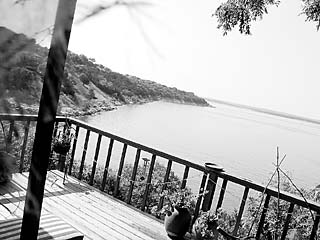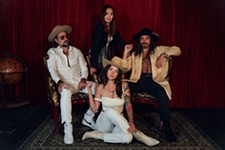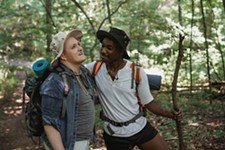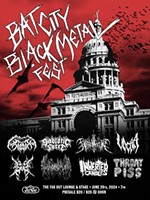Paradise
Alejandro Escovedo and his velvet guitar
By Raoul Hernandez, Fri., June 28, 2002

Down the I-35 corridor, hot, excoriated, eternally re-constructing two-lane death alley patrolled by Duel-ing semis, maniac truckholes, and Texas state troopers, hang a right at New Braunfels just outside San Antonio. Take 306 until you hit the outer ring of Saturn. Out past Purgatory Road, past roadside vultures frenzied on carrion, another right at the American Legion outpost. Up the hill. Stop at Canyon Lake.
At a green cabin on concrete stilts, park in the turnaround b-ball court by the boat gear. All the trees can't hide the aqua expanse below, nor three levels of observatory on this matchbox house. Tarps, towels, fishing poles, fins, and water sandals lay strewn about the hillside like victims of last night's beach party massacre, washed up by the perfect storm. Conquistadors once told of this oasis hidden in the wilds of Central Texas. Place looks deserted.
"We went to get the kids," reads the note tacked to the front/back/side entrance, the scent of Sharpie still hanging in the air. The kids in Austin. "Be back shortly. Make yourself at home -- food in the fridge. Lake is yours ..."
Two splintery flights descend from the mainframe level out onto a third-deck satellite landing, home to at least one ancient tiki torch, picnic table, and instrument of sacrifice: Webber. An avalanche of crumbled topsoil waxes the windmilling lakeside slope along with enough recycled glass to fill in the Gulf of Mexico's Chicxulub Crater. Tangled strands of holiday-light barbed wire edge the slalom path, but in the midday glare, the cola-bottle blues, greens, and golds radiate a glacial glint. Large reptiles tanning atop the flat shoreline boulders are the only ecosystem MIAs. Inlet gurgles and rippled gales tickle the silence.
Losing no wind on the steep climb back to the verdant shanty, a Cape breeze wafts through the screened-in porch that opens onto deck numero dos. Like the afternoon tranquility, it pulls up shy of the sliding glass door into the living room. Inside, a shutter somewhere, loosened to the elements, sounds insistently against the chalet. This, in turn, is drowned out by the dwelling's bohemian rhapsody.
While Patti Smith stampedes her newsprint Horses up the staircase, the True Believers call out loteria imagery from a frame behind the couch. Beefheart, Bowie, and the Velvet Underground sun themselves on the windowsill next to the entertainment center armoire, the Ramones idling nearby. A black and white snapshot of San Francisco's Nuns, teetering on a stack of maps and legends that cover the dining nook table, trumpets punk's original Prince Valiant bangs. DATs, discs, record store displays -- in these gypsy digs, the volume knob is broken off on 10 without the stereo being on.
And music is only half the spectacle. Here, the random clutter of everyday life competes with nonexistent decibels. For every reel-to-reel tape player, there's a clothesline of paper cutouts stretched overhead. For every acoustic guitar and pair of wilted cowboy boots, a half-dozen bathing suits. Bats, gloves, and an autographed baseball card of Roberto Clemente testify to a faith as binding as Catholicism or Buddhism, both of which have turned this homestead into a home altar. Lady Madonna and Shiva weep and wave on every wall.
Words and pictures are their own religion, from Kipling's Kim and Federico García Lorca's torn verse to Mappelthorpe and a small basket of Kodak moments under the Nuggets box set. A photo book, full of dark-eyed Mexican women and defiant Mexican men, in San Antonio 50 years ago, flips through like a movieola.
Given the abundant trappings of childhood jack-in-boxed throughout the downstairs, the seven steps to the second floor are surprisingly white shag. To the right, the kids' room -- bunnies, soccer balls, and India's symbol of buena suerte, pachyderms. Leaning on one of the twin beds, a plastic guitar-keyboard. At the opposite end of the hall, the music room: guitar cases, a picture of Mick Jagger, a poster of Satchel Paige, and a Yamaha YS200 on the desk. In the tiny bookcase by the closet, a row of 45s: Neil Young, Gang of Four, Shaun Cassidy. TV and PlayStation are off.
A doorway hung with beads and one final ascent are all that separate the upstairs loft from the rest of the castle. The grownups have their own shower, their own turntable and records, their own upper deck on which the vista reveals itself like the Mediterranean. Exhale. In the crammed kitchenette directly beneath the royal bedchamber, on a vertical scrapbook doubling as the refrigerator, this bedraggled rock & roll resort suggests its ideological antecedent.
"Nobody starts off to play an instrument with the idea of making money," reasons Keith Richards on a glossy tearaway. "You learn the guitar because you have this burning desire."
Nellcote. The Riviera villa where the Rolling Stones family circus rolled a music history seven (the hard way) in the basement of the guitarist's exile domicile. A metaphorical stones throw from Canyon Lake.
Shine a light in the turret and wait for the man.
Everybody Loves Him
Hector Muñoz is 40 minutes late. Drummers. Fortunately, the beer line inside Waterloo Records is longer than any three warm-up bands. Alejandro Escovedo, meanwhile, planted on the walkway out front of his former place of employment, looks like he's getting ready to rob the place. Tight black T-shirt stretched on taught crimson skin, RayBans, boots, jeans, and a straw shit-kicker. Cable Hogue wasn't this outback. Smiling John Kunz hugs his old cashier.
When Escovedo's posse finally crowds the bandstand inside, there are more people onstage than the Polyphonic Spree. Keyboards, twin strings (fiddle & cello), guitar, bass, and Hector. The magnificent seven. The mob spread out in front of them licks its lips as if swift justice is about to be served. What they get instead is slow, bell-tolling confession, "By Eleven" chased with "Five Hearts Breaking," both from Escovedo's solo debut, 1992's Gravity. Like Thirteen Years, its equally heavy follow-up, Gravity is celebrating its millennial makeover with the standard Waterloo in-store. Rending grief still marks the pair of LPs, but the remastering is revelatory. Brand-new bloom. Intoxicant.
"Nice to have these records out again," announces Escovedo. "A lot of these songs were probably written while I was working here," he waves at Waterloo's front counter, "... while I was on the clock."
Easy laughs. While introducing the band, he can't pass up another free throw. "Hector Muñoz," he says, sweeping his regard. "We've been playing together 17 years ... and I know he's enjoyed every minute of it."
The rim shot counts the group back into action, "Bury Me," "Falling Down Again," and "Pyramid of Tears" rising and falling like Gravity's holy trinity. Now the band's warmed up. With its mostly altered lyrics ("things don't turn easy once you turn 51"), "Pyramid" tears off like gunned by its alter ego, Escovedo's mothballed metallic cruiser, Buick MacKane.
As the band bears down, a young father cradles his 10-year-old daughter in his lap on the floor beneath the Escovedo gang. She looks like a crumpled rubber band, bored out of her gourd. Dad looks like it's his first trip to the zoo -- delighted! Mouthing the words, he sways blissfully back and forth. Another fan also mouths words. "Great! Fuckin' great." This is the black shiny beast they've come to absolve.

The redolent sweep of the Thirteen Years theme fades into a doleful version of "She Towers Above," but even Escovedo just wants to cuts loose now. He swivels around to ask the other musicians what they're hungry for, the answer coming from his own mouth before he can even face them: "Everybody Loves Me." A Mayashaiseilla original (Escovedo's publishing stamp) from 1999's sloshing Bourbonitis Blues. A ball-busting gauntlet that sounds like it was thrown down by Iggy Pop's Lust for Life. Escovedo abuses the whammy bar protruding off his azure axe, a glowering riff hunched low.
"Well I walk, I crawl, but I never run ..."
With keyboardist Bruce Salomon now strapped into a guitar alongside Escovedo and his favorite local sidearm, Fender rifleman Joe Eddy Hines, the three stooges haul off to the fun house. Raw power.
Afterward, Escovedo signs merchandise for the beer line. Maybe it's not quite that long, but with most fans having brought two, three, four items, Escovedo graciously inks autographs across posters, cassettes, even an acoustic guitar, for almost as long as his band's 40-minute set. A melting pot of Austinites, all ilks and ages, offer their swag and praise.
One señora slides foreward the singer's other new release being feted today, By the Hand of the Father, CD companion to Escovedo's stage piece of the same name. Its immigrant song cycle will resonate with her papá. Some joker coerces the musician into leaving a message on his friends' cell. Escovedo does, en español.
"I saw you at the Continental Club, last Halloween," beams an enthusiastic convert. "That was one of the best shows I've ever seen."
"That was a good show," nods Escovedo.
That was a life-and-death decade.
A Man Over the Influence
In the reissue of Gravity, Escovedo's liner note describes the period following the suicide of his wife Bobbie LeVie as a "deafening roar." In the 10 long years between said cataclysm and the release of his most successful solo album, last year's striking A Man Under the Influence, Escovedo remarried, had two more children, cut a half-dozen albums, and was diagnosed with hepatitis C. He turned 51 in January. Easy.
"Everything led up to this record from Gravity," says Escovedo, sitting up in the chaise lounge recliner on the top perch of his leased arbor. "Gravity was a really important record for me on many levels. Emotionally and musically. Ten years later, I've been through a lot more. It hasn't been easy. It's been a lot of work, and I've done nothing but struggle all the way. It's important we never gave up."
Casualties include his marriage to former Pork rock queen Dana Smith, and an Austin residency of 20 years. On la otra mano, his health checks up as "good." Twenty-one-gun salutes to Jägermeister are a blur of the past, and señor "Crooked Frame" licks his lips when asked how he likes cohabitating on the outskirts of soul food central, his native San Antonio. This October, producer of an altogether different half-dozen, Escovedo, and girlfriend Kim Christoff, are due their first esquincle -- the names Marseilla, Sha Shai, Maya, Paloma, Paris, and Juanita have already been embodied.
Given his growing siredom, it's propitious that A Man Under the Influence has been Escovedo's best-selling album to date; sales hover in the vicinity of 30,000, with projected sales as high as 50,000 by year's end. Locally, credit goes to KGSR for the station's continued volleying of Man's tag-team anthems, "Castanets" and "Velvet Guitar," both of which now receive the most ardent reception during big Al's Austin performances. The connective tissue between best and bestseller, Gravity and A Man Under the Influence, is tenuous at best.
"Gravity is a real desolate album," states Escovedo. "Kind of like de Chirico, the Spanish surrealist, with those empty streets. A Man Under the Influence -- to me -- is like an Alejandro Jodorowsky film. Very intense, but colorful. Like something happening inside a carnival. Angst and drama within this really colorful setting."
A Man Under the Influence of what?
"I wrote a song on the record that was a tribute to Townes [Van Zandt]," explains Escovedo, "The one, 'I'll follow you around, I'll follow you down.' I once read an interview he did in Musician, with a blues man, an older man. They were talking about channeling the blues -- how important they were as channelers of those emotions. Townes to me was always one of those artists that was possessed with it. I don't think he could intellectualize exactly what was happening to him chemically and spiritually as he was writing these songs and singing them. Man Under the Influence is about being addicted to that search for beauty and truth. Love, art."
Hence the Cassavetes reference of the title.
"Right. Cause Cassavetes was another figure to me that was obsessed. He had a vision. He knew. His style of making those films, the kind of language that he wanted to portray within those films, is completely different from Hollywood. He also never gave up, and he did it on his own. He was very much his own man."
But yours has always seemed less of an obsession than a case of possession -- by the music.
"That's what I was trying to get at with that song about Townes. A man possessed. You are possessed by it. Right now, at this point in my life, after having done this 30 years almost, there's nothing else I would ever wanna do. I would never trade anything for what I've done musically. I'm one of the luckiest human beings on the planet. I got to see so much in my life musically, and be so close to it because of my brothers. I was really fortunate.
"At the same time, when you choose to follow the life, to chase whatever it is -- like a gambler -- you're possessed. And it's sweet sometimes, and it's extremely painful a lot of the time ...

"Everything that happened after Bobbie died was just so ... crazy. Just craziness. Like not even being able to feel anything for so long. Not being able to make any sense of anything for a long, long time. It took years. Really, took years.
"Those 10 years [between Gravity and Man], it's probably taken the last year or two for me to make sense of everything that's happened to me. Seriously. It's taken a long fucking time."
By the Hand of Pedro
By the Hand of the Father was born among the migas and cerveza of Congress Avenue cantina Las Manitas during SXSW 99. There, Escovedo and friends mariachied their way through a musical-in-progress about Mexican immigrants from turn-of-the-century America.
Escovedo's father, Pedro, was just such a man, though he had junior beat by five children. All 12 are musically inclined, some (Pete, Coke, Alejandro, Javier, Mario) more than others -- the collective brood's tale of assimilation and resentment encompassed in By the Hand of the Father, a mix of impressionist Latino theatre and chamber rock show. To "Why this, why now?" Escovedo answers with a stream of oral history.
"The original idea was that I was going to present a song cycle to my father. A lot of the first songs I wrote were about my father. 'The Rain Won't Help You When It's Over,' 'Hard Road,' 'With These Hands,' 'Ballad of Sun and Moon' were all early [True] Believers songs. The first batch of songs I ever wrote.
"I'd always been so interested in my father's story. We were recording With These Hands in L.A., out in the valley. This place called Cucamunga. My brother Pete was recording in the same studio, up above us. I had no idea. So he comes down, and it was beautiful to see him. Not only is he there, but so is Juan, his son, and my nephew Peter Michael is producing the record. Sheila E., my niece, and Zena, my niece, and Juanita, my sister-in-law, are all there. We're all gonna be there two, three days, so I ask them to come down and play.
"Pete comes down, and the whole family sets up and plays. This big semi drives up and unleashes Sheila's rig. I go, 'It's one song, Sheila.' [Escovedo laughs] So we play the song, and as we're listening to playback. Sheila's going, 'See Dad -- Pops. She calls him 'Pops.' She goes, 'See Pops, look what it took to get you guys to play together. You guys should have done this a long time ago.'
"So I start telling him about this story, this idea I've got. 'Let's do a song cycle based on my father's life, with the whole family playing on it.' Javier, Mario, myself, Sheila, Pete. Philip, my brother Philip, who was still alive at the time. My brother Bobby, he plays the drums, too. My sister Cookie sings. 'Let's all do a story on dad's life. We'll give it to him for his 90th birthday.'
"Well, Paula Batson was there. She was my publicist at the time. She became interested in this. She starts saying, 'This would be great onstage. We could do a lot with this.' We start talking about all these ideas. I start telling her about how people in my family are dancers, so we could choreograph it.
"I was on tour at the time, and when I came back, she introduced me to a theatre company called About Productions -- Theresa Chavez, Rose Portillo, Eric Gutierrez, Teresa's husband Oscar. We start talking. I was on tour with Jimmie Dale Gilmore; we'd just played a show at the Roxy. I was headed straight for a family reunion, and I'd been telling my brothers about this idea.
"Unfortunately, I was also very sick at the time. That was the initial hep C breakdo ..."
Three-year-old Juanita teeters groggy behind Escovedo's chair, a knot of strawberry blond curls and tiny fists for eyes. Paloma, 11, and her friend Ava decide now's the time to repot that deck planter.
"Is that Juanita?" turns Escovedo, left then right. "Where's little Juanita? Ti-ti? Juanita?"
Down the stairs she shimmies, the other two right behind her. Escovedo doesn't miss a beat.
"... so that never happened. But that began the collaboration with About Productions. When I got better, I went back to L.A. and began researching the whole thing, figuring out what we could do.
"It became the story of my father. What was going to be the story of my father, Teresa fleshed it out so it was the story of five different men, all related to us. Celebrating their journeys across the border, talking about the labor they had to do to survive in this country. The romances they had, the marriages they had here. And their families.
"Then we, their children, begin asking them real pointed questions about some of the traditions they brought across the border: machismo, the way they treated women -- their wives, their daughters. Their silence. Why so silent? Just all of those things.
"Then it comes full circle in that it embraces the father and says, 'Even though you did this, and I did this, my children aren't going to be that way. But I do love you, you are my father, I love you very much.'"
What was your father's reaction?
"My father's never seen the play, but he's heard the record. My father doesn't travel well at 96. But he listened to the whole album and afterward he says, 'I really like what you're doing now. You slowed everything down. I can hear the words. It's beautiful.'

"That's what the whole thing was about. My personal reason for doing the whole thing was to show what his life had meant to me. What those stories had meant to me. I was hoping that they would keep somehow on record. That they would have a history of their own, that my children would learn from, and they'd tell to their children. What he did for us."
Kawil of Rock & Roll
"What's my name!?" Escovedo prompts Ava.
"Mr. King of Rock & Roll!" parrots Ava.
Escovedo, thigh-deep in the lake, breaks into a toothy grin and winks at 10-year-old Paris, who's prowling behind the family cat on shore.
"That's right," intones the patriarch. Wet, his jet-black hair slicked back, the last thing Escovedo calls to mind is a road-dependant musician overseeing his family on a sunset swim.
"Pedro!" protests Kim. Alejandro is actually Escovedo's middle name.
Soon he has them all scrubbing algae off the underwater steps leading down in the water. This is Escovedo's obsession. On the way back to the lodge he whispers, "See why I never wanna leave this place?" He and Kim hope to buy these two acres.
As the clan changes to go to the store, Escovedo pops a tape into the VCR and flops into the love seat in the living room. Silent home movies: His parents' luna de miel in Monterrey, Alejandro as Gene Autry Caballero circa 1956 at a family reunion, a street parade in downtown S.A. With one schizophrenic cut, suddenly it's 1964-65, Huntington Beach, and Escovedo is hanging ten. He watches transfixed as waves wash over the boards and the surfers wash over the waves.
"To be a Mexican surfer was a bizarre thing," he'd said earlier. "Especially in the early Sixties, because all these groups in high school were like low riders, greasers, whatever they wanted to call us -- spics -- then jocks, and surfers, who were kinda like jocks, but were predominantly white kids who could afford surf boards.
"Or Hawaiians, who would come over sometimes. They thought I was Hawaiian. See, I've got one of those faces, where no one really knows who the hell I am -- what nationality."
"Yet if I go to Saltillo, hey man, they know exactly where I'm from. Do you know that there were Mayan ruins around that area? Monterrey and Saltillo? My dad would always tell me, 'We're part Mayan, part Yaqui [Indian]. I'd go, 'Mayan?' And he'd go, 'Yeah.'"
Escovedo's caught a breaker.
"Man, dig this. I had to go to school in Southern California as a kid. You know what they called me? Alex. The teacher would say, 'I can't pronounce this ...' So years later, here I am a recording artist for Rykodisc, and radio promotions is trying to get my record played on the radio. The music directors are calling up and saying, 'We can't pronounce this name, how do you expect us to play this record?'
"My first record comes out, Gravity, where's it filed? World Beat, Latin, Salsa. Everywhere but rock. When I was in Rank & File, we played a big show at the Hollywood Palladium. I went out for a walk on Hollywood Boulevard, came back, knocked on the front door. They said, 'Hey man, the kitchen's over there.' 'I'm fucking playing man.' It's still everywhere.
"My attitude is so different now. I'm not afraid to rock in their world. I remember Javier, Rhoda, and I, driving from Georgia, where we were making the True Believers record, to Louisiana, where we had a gig. We got pulled over and the first thing he said was, 'Y'all speak any English?'
"That's what [my song] 'Paradise' is about, going through Germany, and they think I'm Vietnamese."
Hear the wolves a howling
The crowd it claps for more
And I thought I heard you praying
It's just the closing of the door.
-- "Paradise"
Paradise has multiple meanings. ![]()
By the Hand of the Father premieres in Austin and runs for three nights only, Thursday, June 27 through Saturday, July 30, at the Texas Union Theatre. Shows Thursday and Friday are at 8pm and feature guests Rosie Flores and Ruben Ramos. Two shows Saturday, 7 & 10pm, with special guest Pete Escovedo. Tickets are $26.50 at all Texas Box Office outlets. Call 512/477-6060 to charge or purchase tickets online at www.texasboxoffice.com.








